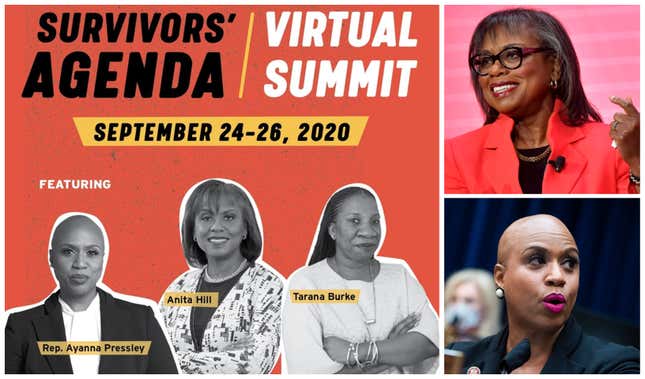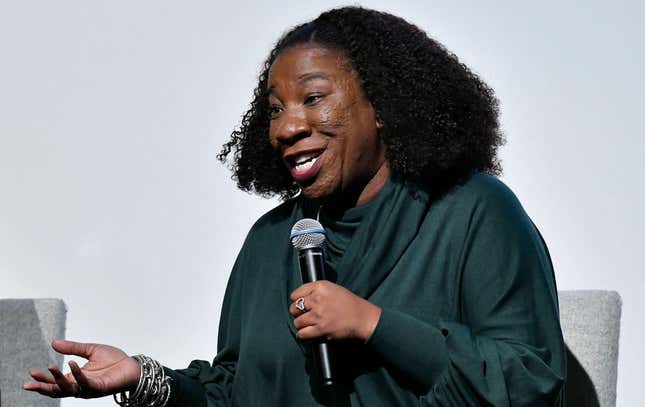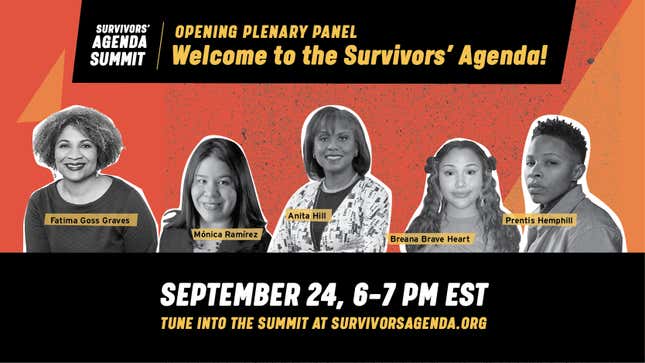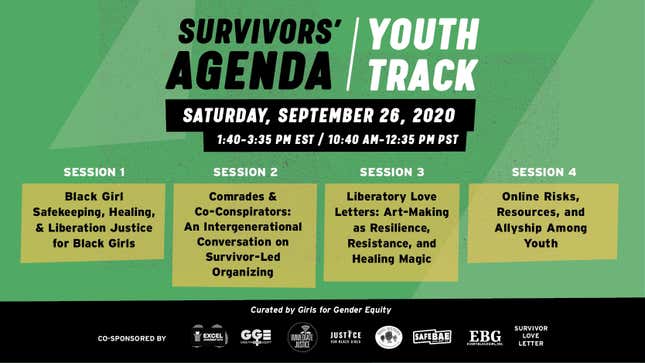
In the three years since the Me Too movement entered mainstream discourse, much progress has been made—namely, belated focus upon long-alleged, and in some cases, now-convicted predators, and the beginning of a reframing of the way in which we acknowledge and speak about the spectrum of sexual abuse, from harassment to assault. For Tarana Burke, who coined Me Too as a hashtag and built a now-global movement, it’s only the beginning, as she is taking a multipronged approach to the transformation of our communities, communication, the upliftment of Black girls and femmes, and the experiences of survivors of sexual violence.

“I think this moment demands a lot of things that we have not been accustomed to before, but one thing that we are accustomed to is tenacity—and resilience,” the founder of ‘me too.’ International told me in August, during our conversation for The Root Institute. “Our folks figure out [how to] make a way, recreate, create new when we have to. And so, I think that that’s what we’ve seen in this moment. But it also requires us to not stop.”
With that—and forward momentum—in mind, tonight Burke and a multi-racial coalition penned the Survivors’ Agenda open the first-ever Survivors’ Summit, a three-day event centering the voices and needs of survivors, many of whom are also activists and advocates.
Per a release:
The Summit will amplify the voices of survivors of sexual violence with panels that will highlight a range of topics including workplace sexual harassment, restorative justice, incorporating #metoo in schools, queer and trans perspectives on surviving abuse and violence, and much more. Also: Don’t forget about our powerful plenary speakers who will include beloved ‘Squad’ member Rep. Ayanna Pressley, advocate and Brandeis University professor Anita Hill, Summit co-host and ‘me too.’ founder Tarana Burke, and many more.

The full schedule for the three-day program is now live on the Survivors’ Agenda site and registration is open now. The summit launches on Thursday night at 6 p.m. ET/3 p.m. ET with an “Opening Plenary Panel” featuring advocate, Chair of the Hollywood Commission, and Brandeis University professor Anita Hill; Fatima Goss Graves, president and CEO of the National Women’s Law Center; Mónica Ramírez, founder and president of Justice for Migrant Women; youth Indigenous activist Breana Brave Heart, and Prentis Hemphill, founder of the Black Embodiment Initiative. Rep. Pressley (D-Mass.) will close the summit on Sunday as its keynote speaker.
Other featured guests will include: A Long Walk Home co-founder Tillet; cultural worker Aishah Shahidah Simmons (NO! The Rape Documentary); gymnast Maggie Nichols; and Angie Jean-Marie of TIME’S UP, who will welcome Saturday’s guests. Also appearing will be representatives from advocacy organizations Futures Without Violence, Healing to Action, Know Your IX, Center for American Progress, the Women’s March, The National Network to End Domestic Violence, and more—and of course, Burke herself.
A Survivor’s Summit Youth Track will also take place on Saturday, spearheaded by Girls for Gender Equity and led by youth survivors who “will lead and engage this initiative in critical and transformative conversations,” says Me Too, adding that the track “will feature panels centering on Black girls’ healing and liberation, the importance of centering youth experiences in movements and organizing, the power of healing and self-love, and more.”

Burke’s commitment to the safety and success of Black girls is steadfast; on the Sept. 15 anniversary of the 16th Street Church bombing in Birmingham, Ala., that killed four Black girls in 1963, she joined fellow Black women leaders in the launch of the Black Girl Freedom Fund. Recognizing that currently, philanthropic organizations only donate $5.48 per woman or girl of color in the United States, the initiative aims to raise $1 billion over the next 10 years to “mobilize investments ‘in the brain trust, innovation, health, safety, education, research, and joy of Black girls and their families.’ according to a statement provided to The Glow Up.
Burke was joined in this effort by co-founders Tillet, Goss Graves, Dr. Monique Morris (Executive Director, Grantmakers for Girls of Color and author/filmmaker of PUSHOUT: The Criminalization of Black Girls in Schools), LaTosha Brown (founder of the Black Girls Dream Fund organized by the Southern Black Girls & Women’s Consortium), Joanne N. Smith (Founding President and CEO, Girls for Gender Equity), Scheherazade Tillet (co-founder, with her sister, Salamishah, of A Long Walk Home) and Teresa C. Younger (President and CEO, Ms. Foundation for Women).
The coalition launches via an open letter and social media campaign (#1Billion4BlackGirls), which included signatories Ciara, Beverly Bond, Marley Dias, Kamilah Forbes, Melissa Harris-Perry, Valerie Jarrett, Luvvie Ajayi Jones, Rashida Jones, Jurnee Smollett, Gabrielle Union, among others, and read, in part:
At this very moment, Black Lives Matter has emerged as our nation’s largest political movement and racial justice is receiving unprecedented philanthropic support. And yet, Black girls and young women still remain adultified, victimized by violence, and erased from the very same social justice movement for which they continue to risk their lives.
We, Black women, and Femmes activists, artists, educators, organizers, and philanthropists, have come together at the historic time to call attention to the fact that Black girls in the United States are in crisis. From discrimination in education and healthcare to sexual assault and policing, the lives and livelihoods of Black girls and young women are notably absent in the public narratives, policies, and justice movements most crucial to addressing inequality and racial trauma...
The tools and tactics that have justified structural violence against Black women and girls are being used to subjugate all of our communities. Black women’s and girl’s voices, visions, and experiences are essential and necessary for the liberation of all Black people.
Together, these two initiatives have the same aim: the upliftment and protection of Black femmes across America and beyond. As Me Too reminds us, “envisioning a world without violence doesn’t have to be a figment of our imagination...it can be a reality we create with our collective power.”
Registration is open now for the Survivors’ Summit.

